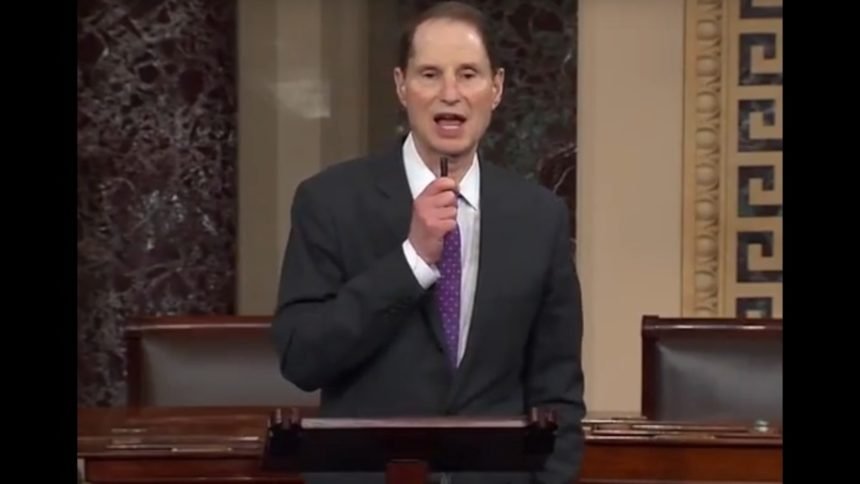Wyden pushes election security bill on Senate floor

Sen. Ron Wyden, D-Ore., on Tuesday joined his Democratic colleagues Senate Minority Leader Chuck Schumer, D-N.Y., Senate Intelligence Committee Ranking Member Mark Warner, D-Va., and Sen. Richard Blumenthal, D-Conn., to push for a package of election security bills on the Senate floor in a series of unanimous consent requests.
“Despite all of the ways foreign hackers have already made it into our election infrastructure, Congress has refused to arm state and county elections officials with the knowledge and funding they need to secure their systems,” Wyden said. “I fear the 2020 election will make 2016 look like small potatoes.”
Wyden took to the floor to pass the House-passed Securing America’s Federal Elections (SAFE) Act, which would mandate paper ballots, routine, post-election risk-limiting audits and federal cybersecurity standards for election systems. U.S. Sen. Marsha Blackburn, R-Tenn., objected.
“The SAFE Act has all three key elements recommended by our nation’s top cybersecurity experts: paper ballots, security standards and post-election audits, as well as the funding necessary to make sure states can live up to the new standards,” Wyden continued. “Mr. President, the SAFE Act represents the most comprehensive defense against foreign election hacking. I urge my colleagues to reconsider their opposition to this vitally important legislation.”
Warner attempted to pass the Foreign Influence Reporting in Elections (FIRE) Act and Blumenthal attempted to pass the Duty to Report Act, both of which require campaigns to report if they are contacted by foreign actors seeking to influence American elections. Sen. Blackburn objected to both bills.
A full version of Wyden’s prepared remarks are available below:
Mr. President, we are 266 days away from the 2020 election and Mitch McConnell has yet to take any concrete steps to protect our federal elections from hacking or foreign interference.
Thanks to this legislative blockade the United States Senate has been totally derelict in its duty to stop foreign cyberattacks on our elections.
Mr. President, there is not a single mandatory, nationwide election cybersecurity standard on the books.
The election security debacle of 2016 was four years ago, but this body refuses to act. Don’t forget, Russian hackers probed all 50 state election systems. Russians hacked at least one election vendor. Russians penetrated two Florida county election systems, according to Florida’s governor. That’s just what we know about.
Despite all of the ways foreign hackers have already made it into our election infrastructure, Congress has refused to arm state and county elections officials with the knowledge and funding they need to secure their systems.
I fear the 2020 election will make 2016 look like small potatoes. The list of threats and vulnerabilities is enough to give you a migraine.
There were the ES&S voting machines that for years came with preinstalled remote access software.
There’s the fact that Russia hacked an election vendor called VR Systems in the summer of 2016.
VR systems machines in North Carolina malfunctioned on Election Day that year, and one polling place had to shut down for hours. It took two and a half years before the Department of Homeland Security investigated what happened.
Right now, many election officials across the country are buying election systems they believe are high-tech, but they’re vulnerable to hacking and out-of-date the moment they come out of the box.
There is the spread of mobile voting apps like Voatz that have never been vetted by top security experts.
There’s a reason cybersecurity experts have been sounding the alarm for years, warning that putting computers between a voter and their ballot is a recipe for disaster.
What happens when the “glitch” changes a candidate’s vote totals by just 2 or 5 percent, instead of 50 percent? What happens when a glitch shuts down machines in some precincts and not others, disenfranchising voters and skewing election results?
Five states still exclusively use hackable, paperless voting machines, and nine other states still use paperless machines in some counties.
The problems are daunting, but Mr. President, the solutions are clear.
My bill, the PAVE Act, mandates the three key priorities that experts most universally recommended - paper ballots, routine, post-election risk-limiting audits, and federal cybersecurity standards for election systems.
Last year the House passed a major election security bill, called the SAFE Act, which included significant portions of my bill.
Senator Klobuchar introduced the Senate version of the SAFE Act, which I’m proud to co-sponsor. The SAFE Act has all three key elements recommended by our nation’s top cybersecurity experts: paper ballots, security standards and post-election audits, as well as the funding necessary to make sure states can live up to the new standards.
Mr. President, the SAFE Act represents the most comprehensive defense against foreign election hacking. I urge my colleagues to reconsider their opposition to this vitally important legislation.
Mr. President. To protect our elections from foreign interference, I ask unanimous consent that the rules committee be discharged from further consideration of S. 2238, the SAFE Act; the Senate proceed to its immediate consideration; that the bill be considered, read a third time and passed; and the motion to reconsider be considered made and laid upon the table, with no intervening action or debate.